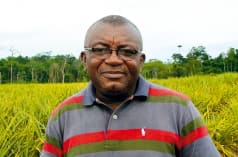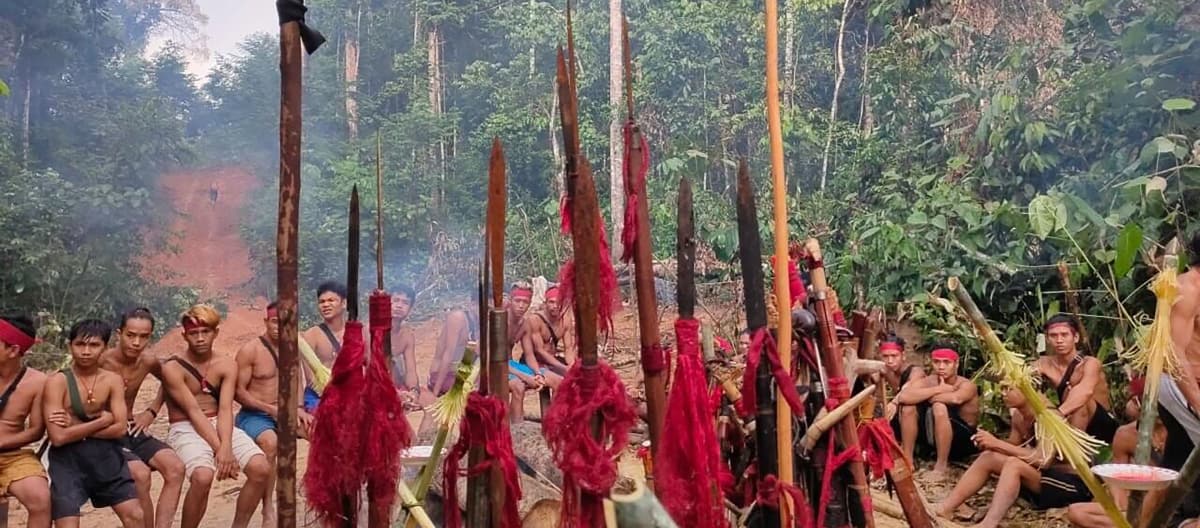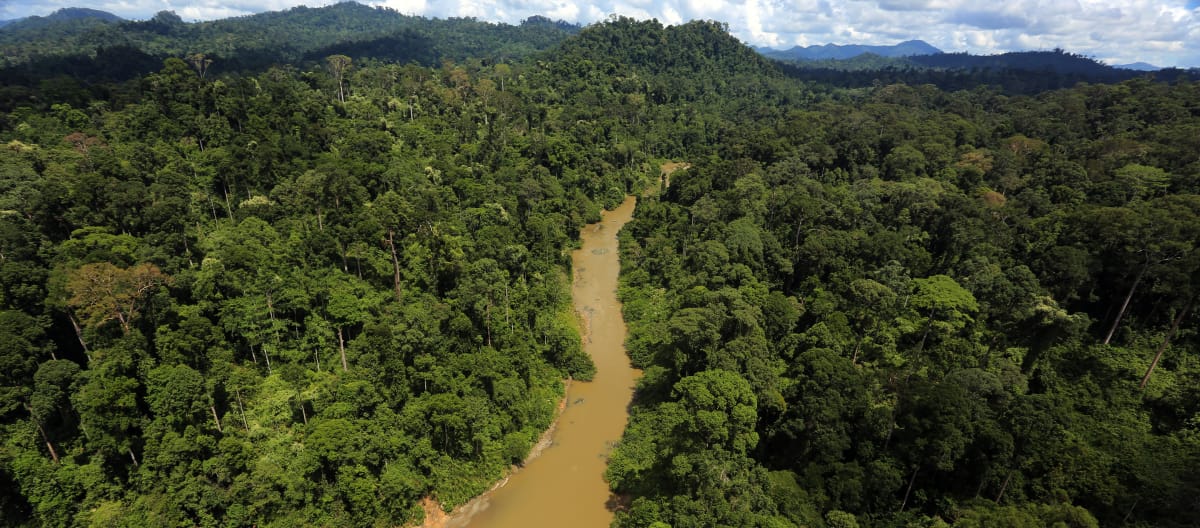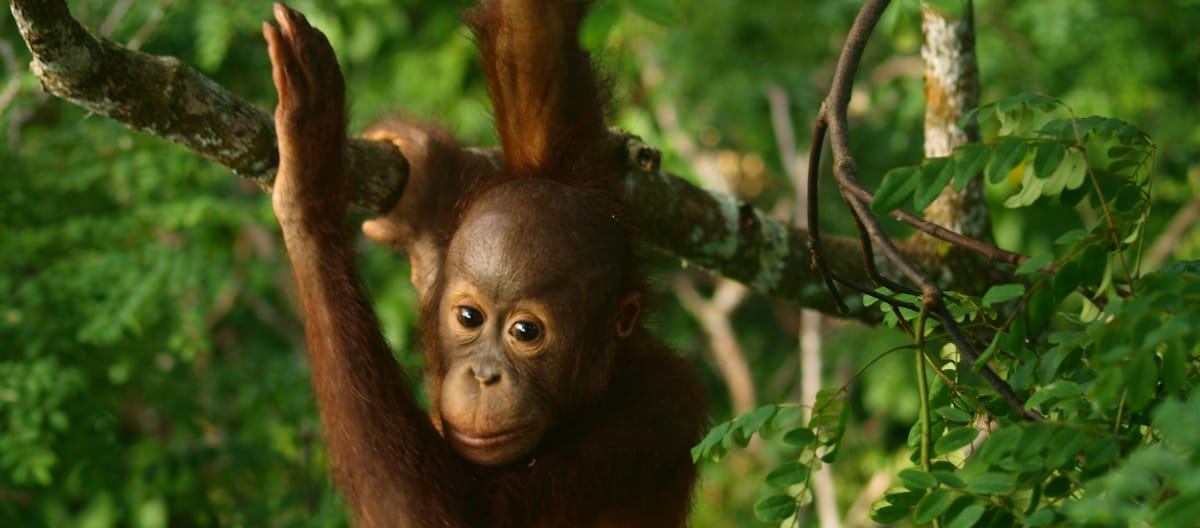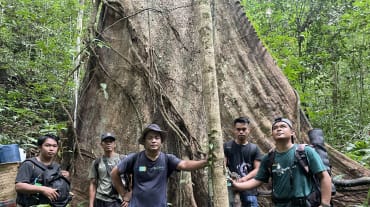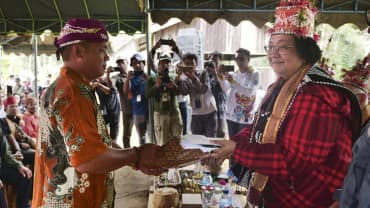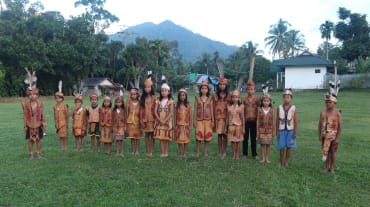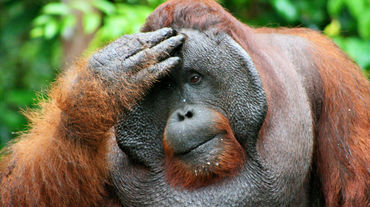Protecting Borneo’s rainforests and empowering Indigenous people
Resisting the destruction of the ancient forest giants has made true fighters out of the activists of Save Our Borneo (SOB). Their mission is to stand in the way of palm oil companies and help Indigenous people secure urgently needed land rights.
Project Overview
Project FocusEcosystems / Rainforest Defenders
Project Objective stopping the deforestation of Borneo, securing Indigenous rights, uncovering environmental crimes
Activities campaigns, research, raising awareness and projects on forest rights
The rainforest at the sacred mountain Bukit Sebayan on the Indonesian part of the island of Borneo is lush, healthy and beautiful. The jungle is home to critically endangered orangutans. The Dayak Tomun people, who have lived in the forest for many generations, use fruits, medicinal plants and wood from the forest sparingly and knowledgeably – just as their ancestors did.
No wonder, then, that environmental activist Nordin founded the organization Save our Borneo (SOB) here in 2006. In the mountains, ancient trees still reach for the sky. In the lowlands, however, they have been felled and millions of oil palms have taken their place. The palm oil tragedy unfolding in his homeland turned Nordin into a fighter.
Nordin passed away in 2017, but his spirit lives on and continues to drive the activists of SOB today. They have internalized the idea that inspired him to found the organization:
“The forest and the land are for people and wildlife, not for plantation companies. With our traditional way of life, we can maintain the rainforest, use it sparingly and protect it.”
Indigenous and forest rights preserve the rainforest
Like many Indigenous peoples around the world, the Dayak Tomun have been living in and with the rainforest since time immemorial. Studies have shown that wherever Indigenous people live and work to preserve nature, forests are healthier than elsewhere. Indigenous forest rights are thus a crucial factor to conserving rainforests.
Every clear cut means a loss of biodiversity, so both the local environment and the planet as a whole suffer whenever a tropical forest is destroyed.
The founding of SOB was a call for help to the international community. Despite its English name, Save our Borneo is a local organization working at the grassroots level. Small, nimble and well-connected, it responds quickly to local people’s reports of environmental crimes. The activists often spend days at a time on the road to bring vital information to the remotest villages.
SOB has been one of our closest partners since 2007. The activists organize resistance against land grabbing and deforestation with spectacular campaigns and actions. They do not shy away from confronting powerful corporations or stonewalling officials when exposing crimes against nature and corruption and taking them to court.
SOB and the Indigenous Dayak Tomun people are committed to protecting the Kinipan forest in the mountains of Borneo and resisting a palm oil company that is clearing forest on their ancestral land. The small village of Kinipan, which in Indonesia has become synonymous for the fight for forest rights and for resistance against deforestation, has risen to international fame – thanks in part to the work of SOB and Rainforest Rescue. The case was publicized in videos and the feature-length documentary Kinipan, and nearly 250,000 people from all over the world have signed our petition “Please help us save Kinipan forest”.
The most important goal: stopping deforestation
Another focus for SOB has long been the restoration of cleared peat forests. When intact, they are waterlogged and swampy. Considering the vast amounts of carbon they store, all peat soils and peat swamp forests on the planet urgently need protection for climate reasons alone. Scientists warn that without them, the world will never meet its climate targets. Yet every year, peat bogs on Borneo go up in smoke. The main causes of this disaster are man-made: slash-and-burn clearing for yet more plantations, mining, and drainage canals to dry out the peat soils.
In 2020, the Indonesian government decided to convert these sensitive peat areas into industrially cultivated rice fields as part of its “Food Estate” program. SOB is lobbying against the program's implementation and raising public awareness of its dangers.
SOB’s work has four major focal areas:
- securing Indigenous and forest rights
- mediating land and agricultural conflicts
- uncovering environmental crimes
- stopping deforestation
The environmentalists and human rights activists use a range of strategies and solutions. Property titles are proven tools for protecting nature, and so they help draw up maps and documents for communities and assist them in applying for forest rights to their ancestral land. The organization also consults historical surveys and organizes training courses for surveyors.
SOB advises communities on how to defend themselves against land grabbing. The organization provides legal assistance when villagers and environmentalists are robbed, threatened, criminalized or imprisoned while fighting for forest rights. It conducts research and documents the activities of palm oil companies using drones and other tools. SOB regularly succeeds in curbing the expansion of palm oil companies and exposing their connections to politicians.
All of this serves the overarching goal of stopping deforestation. SOB’s successes give people the courage to keep up the fight for the rainforest.


